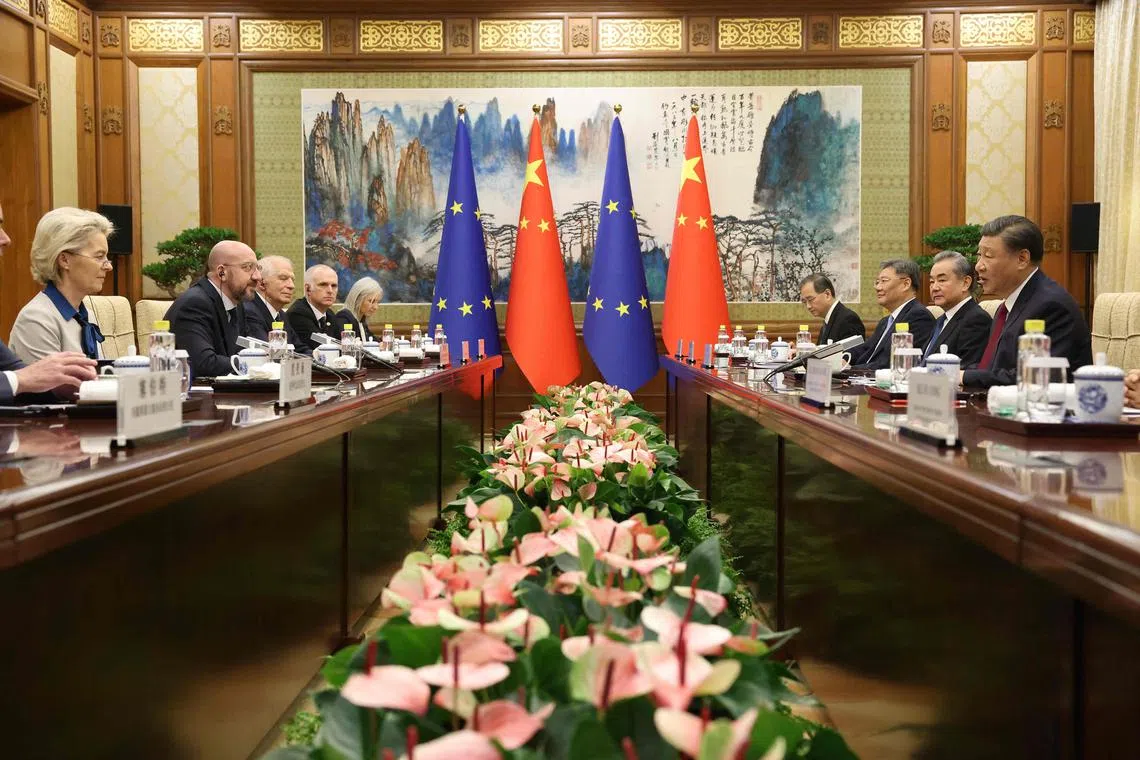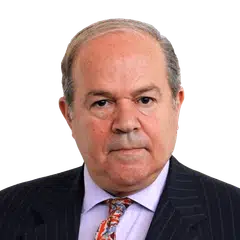News analysis
EU-China summit fails to move the trade dial
Sign up now: Get ST's newsletters delivered to your inbox

Hopes that China may be ready to improve its links with Europe, given its economic problems and tense relations with the US, remain unfulfilled.
PHOTO: AFP
Follow topic:
LONDON – The European Union’s top leaders returned from a summit in Beijing empty-handed after the Chinese government refused to offer any concessions on trade imbalances. Nor was there any movement over China’s refusal to condemn Russia’s invasion of Ukraine.
Mr Charles Michel, the former Belgian prime minister who represents the heads of government of the EU’s 27 member nations, and Dr Ursula von der Leyen, president of the European Commission, the EU’s executive body, claimed that they remain optimistic about dialogue with Beijing.
“Our relationship with China is complex, and we have a responsibility to make it work,” Dr von der Leyen told journalists on Dec 7 after the Beijing summit.
But the European Commission president also repeatedly referred to the talks with Chinese leaders as “frank and open”, traditional diplomatic codewords for difficult and divisive negotiations.
And in an unusual development indicating enduring tensions, a senior Chinese diplomat offered a detailed point-by-point public rebuttal of the EU’s negotiating positions just as the visiting EU leaders were briefing foreign correspondents in Beijing about the outcome of their summit.
This was the first face-to-face summit between China and the world’s single biggest trading bloc in four years; previous EU-China summits were either cancelled because of the pandemic or were held online.
Aware of her reputation as a critic of Beijing, Dr von der Leyen sought to tone down the rhetoric during her China visit.
While she stuck by a demand she articulated in March, calling on Europe to “de-risk” its trade relationship with China, she denied that her idea echoes that of hardliners in Washington calling for a decoupling of links with China.
Instead, she explained that her concept of de-risking is about addressing Europe’s “excessive dependencies through diversification of our supply chains”. This was in the light of lessons learnt from both the Covid-19 pandemic and Europe’s previous dependency on deliveries of Russian oil and gas, something which, Dr von der Leyen claimed, allowed Russia to engage in “energy blackmail”.
Yet the European Commission president and Mr Michel, her counterpart, remained adamant on one point – the need to address the EU’s huge deficit in its trade with China.
This currently stands at around €400 billion (S$577.6 billion), double the deficit registered only two years ago and 10 times the imbalance recorded two decades ago.
“Such imbalances are just unsustainable,” Dr von der Leyen warned. “Politically, European leaders will not be able to tolerate that our industrial base is undermined by unfair competition.”
Although Chinese President Xi Jinping and Premier Li Qiang accepted that Sino-EU trade should be more balanced, the summit yielded nothing concrete.
At a press conference convened with the explicit aim of refuting EU complaints while the European visitors were still in Beijing, Mr Wang Lutong, director-general of the Chinese Foreign Ministry’s European department, claimed that the trade deficit is primarily due to Chinese “innovation” rather than subsidies, and is in any case already falling.
The implication was, therefore, that nothing should be done, precisely the opposite of the European position.
The EU officials also got nowhere with their demands that Mr Xi use his friendship with Russian President Vladimir Putin to persuade Moscow to withdraw its troops from Ukraine and that some Chinese trading companies should not assist Russia in bypassing Western economic sanctions.
“President Putin is making his decision based on his national interest and security,” Mr Wang retorted, studiously ignoring any reference to Chinese companies that are allegedly ignoring anti-Russian economic sanctions.
The hopes of some European observers that Beijing may be ready to improve its links with Europe, given China’s economic problems and tense relations with the United States, remain unfulfilled.
This may be because the Chinese calculate that, with elections to EU institutions due in June, Beijing should concentrate on the next generation of the bloc’s leaders rather than on the current ones.
Or it may be because the Chinese simply do not rate the EU as an important political actor and assume that they can squeeze more concessions from individual key EU member states rather than the group’s officials.
Either way, it is clear that the European Commission’s anti-subsidy investigations into Chinese-made electric vehicles will proceed at full speed, with further studies against alleged Chinese trading malpractices in the offing.
And around a dozen Chinese companies may be sanctioned by the EU because they deal with Russia.
As Dr von der Leyen put it, the latest meeting was a “summit of choices”, an opportunity for the Europeans “to explain clearly our concerns and our expectations to the Chinese leadership and, of course, to also seek progress in key areas of our bilateral relationship”.
It will be remembered instead as a summit of missed choices and opportunities.


